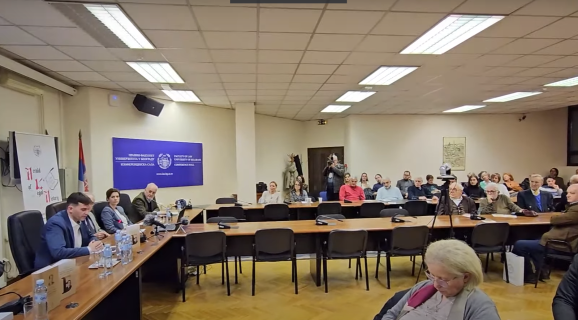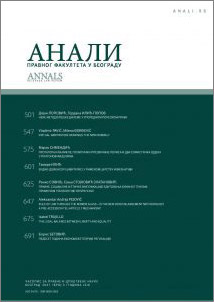
Meeting of the General Seminar, University of Belgrade Faculty of Law, “Mihailo Konstantinović and 27 March 1941”
As part of the General Seminar at the University of Belgrade Faculty of Law, on various aspects of the life and works of Mihailo Konstantinović, and on the occasion of the new editions of the books “Politics of Agreements, Diary Notes 1939 – 1941, London Notes 1944 – 1945” and “The Heritage of Mihailo Konstantinović”, the following participants spoke: Prof. Dr Dragoljub Popović (former judge of the European Court of Human Rights and lawyer), Dr Boris Milisavljević (scientific advisor of the Balkan Studies Institute of the Serbian Academy of Sciences and Arts), Prof. Dr Jovica Trkulja (University of Belgrade Faculty of Law) and Assistant Prof. Dr Nina Kršljanin (University of Belgrade Faculty of Law).
Co-director of the General Seminar, Assistant Professor Dr Miloš Zdravković, opened the panel by expressing great satisfaction at the opportunity to discuss such an interesting person and historical period, and then gave the floor to the speakers.
The first speaker, Professor Dr Dragoljub Popović, pointed out that Konstantinović’s writings cover the creation of the Yugoslav state, as well as the relationship to the coup d’état and the pact with the Axis Powers, within which Konstantinović thoroughly notes other people’s views as well. He added that Konstantinović was against the pact and for the defense of the country, but noted that only a legitimate government could defend it (against Simović’s coup). In the end, he referred to the fact that it is debatable whether Konstantinović resigned as a minister. Popović believes that he did, but that he withdrew his resignation at the persuasion of his friends and Cvetković.
The next speaker, Dr Boris Milisavljević, pointed out the importance of Konstantinović’s legacy, placing particular emphasis on archival material as the source that brings us the closest to a credible representation of the past (even though it is also burdened with emotions, ideologies and impressions). He then stated that the “Politics of the Agreement” includes important questions about federalism, the relationship between different legal and political traditions. Finally, Milisavljević pointed out the significant role of Slobodan Jovanović.
Assistant Professor Dr Nina Kršljanin referred to the problem of studying the history of Yugoslavia in the region, saying that it is a complicated process, burdened by an ideological attitude towards history, that is now gradually being worked on. However, she added that, despite the difficulty of dealing with that period of history in a sufficiently adequate manner, it is studied at the Faculty of Law – just as socialist law is increasingly treated with the necessary ideological distance. In the end, she drew attention to the current problem of recent and upcoming generations of children and students who lack a basic knowledge of history.
Branka Dragosavac, as deputy manager of the Faculty of Law library and reviewer of newly published books, thanked the authors for bestowing her with such honour and trust. She pointed out that Konstantinović was the manager of the faculty library in Subotica, as well as the library of the Faculty of Law in Belgrade. She then stated that she was pleased with the general increase in bibliographic research, as well as the fact that the injustice from 1947, when it was said that Konstantinović did not write enough, was corrected and proven quite wrong by the number of bibliographic units listed in these books.
Professor Dr Jovica Trkulja, as the last speaker, thanked all the participants who contributed to the preparation of the books “Politics of Agreements, Diary Notes 1939 – 1941, London Notes 1944 – 1945” and “The Heritage of Mihailo Konstantinović”. As an editor, arranger and co-author, he emphasised that it was not a wasted effort. He then pointed out that the books speak best for themselves, and that he only wants to offer a few remarks. The first of them was related to the fact that these works by Konstantinović capture dramatic times and events. The second is that the London Notes were written as a diary for personal purposes, with no thought of being published, with a request to his son that it be so. However, his son disregarded his request, so that the notes would not perish or be misused, because they were deemed too important. In the end, he said that these publications offer important and necessary additions, comments and interpretations to the otherwise difficult-to-understand material from the notes, which include many names and personalities whose roles are difficult to understand without context. He also thanked the publishers of the book, stressing that it was also a complex process.
At the end ensued the part of the forum devoted to questions and comments from the audience, who expressed great interest in the topic.




